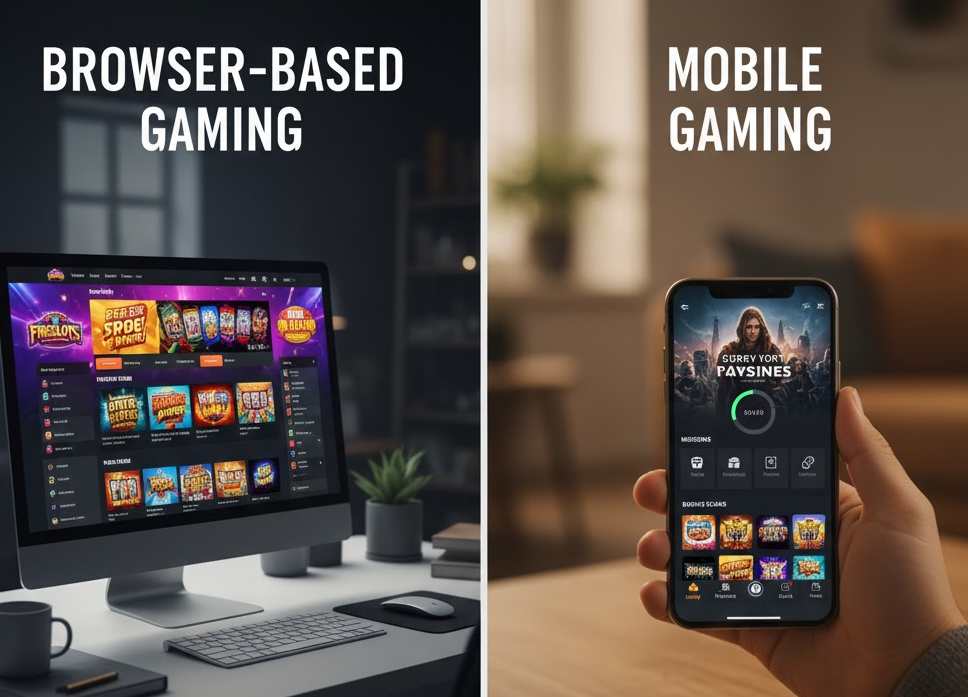How Browser-Based Games Are Changing Mobile Casino Design

Casinos have never been more accessible than they are in the modern age. In the past, people relied on their communities to create small spaces for gambling and relaxation, where men could play cards and dice together. As the gambling industry became more well-regulated, casinos grew.
However, casinos are governed by a complicated set of laws and regulations.
Thankfully for all, casinos have seen great worldwide success online. This success is thanks to two main types of players: those who play on their computer browsers, and those who play on mobile apps.
Browser-based playing has been around since the advent of the internet, with many of the first eSports players playing from their home computers. In modern times, mobile gamers have taken to eSports at unprecedented rates, enjoying the excitement of a win from the comfort of their iPhone or Android device. Still, mobile gaming services take after their browser-based counterparts in many ways.
Safety and Legality
Players who come from brick-and-mortar casinos seeking an online gaming option may be overwhelmed by the numerous websites available. Some might be clunky, difficult to use, and have intimidating interfaces. Others, however, have taken inspiration from classic browser-based games and created well-designed and responsive gameplay. In both the browser-based and mobile gaming arenas, there are several trustworthy gaming sites. Casino experts have reviewed some of these top websites, which are listed in CasinoBeats. This guide explains how online casinos utilize secure payment systems to safeguard players’ accounts and enable them to earn cash safely, either in fiat currency, cryptocurrency, or prize items.
Expert Insight:
“The rise of mobile and browser-based casinos has shifted player expectations toward security and simplicity. Players want reassurance that their data is safe — and platforms that fail to provide that will lose trust.”
— Dr. Anna Morris, Game Design Researcher at University of Nevada, Las Vegas
References:
- CasinoBeats Editorial on Online Casino Safety (2024)
- Gambling Insider Report on Secure Gaming Platforms (2025)
- University of Nevada, Gaming Innovation Research
Game Visuals

Mobile games have several ways in which they emulate their browser-based counterparts. One of the most noticeable similarities between these two types of games is their visuals. Both browser-based and mobile games use visuals to evoke an emotional response in the player. The loading screen features a pulsing graphic that builds anticipation in the viewer.
Browser games use bright, flashing colours to entice players to their banner adverts on browser websites. Players are more likely to ignore the mundane, dull colors of life outside of the screen and become immersed in the exciting world of online gaming.
Mobile games have followed suit by creating advertising for games on social media platforms. Using bright, catchy colours and high-stakes situations, they draw players to download their app. Mobile games have an extra tool in their arsenal: they are more likely to use story-based advertising to draw in new players. These advertisements will feature dramatic events to inspire players to click through.
Expert Insight:
“The psychology of color and motion plays a crucial role in mobile engagement. Borrowing from browser-based visual cues helps developers achieve faster emotional connections with players.”
— Dr. Lisa O’Connor, Author of “Visual Design in Interactive Media” (Routledge, 2023)
References:
- O’Connor, L. Visual Design in Interactive Media (2023)
- GameAnalytics Industry Report on Visual Engagement (2024)
Celebrating Player Progression
Both browser-based and mobile games use clever page design to incentivise players to keep playing. They achieve this by creating spaces where players can track their own progress. This is done by creating progress bars, “missions” for players to complete, and experience-based ranking systems.
Browser-based games have historically been effective at encouraging player retention through these techniques, as well as by establishing a clear relationship between progress and reward. This relationship forms a loop, where players are immediately gratified with a reward when they make in-game progress. This structure is ingrained in browser-based games, and mobile games have followed suit with similar results.
Expert Insight:
“Reward loops are not about manipulation — they’re about creating structured motivation. Players feel good when they see their growth visualized on-screen.”
— Jesse Schell, Game Designer & Author of “The Art of Game Design” (A.K. Peters, 2020)
References:
- Schell, J. The Art of Game Design: A Book of Lenses (2020)
- Newzoo Player Retention Study (2024)
- GameDev.net Forum on Progress Mechanics
Social Connectivity
- Social media has played a significant role in browser-based gaming. Games like Farmville took off in the early days of Facebook, and Facebook’s mobile age gave rise to one of the most popular mobile games of all time: Candy Crush. The ability for eSports and gaming to integrate into a player’s daily social media and browsing habits makes them easier to access; however, it is recommended that players engage in safe browsing habits when clicking through.
- There is also an in-game social element. Players can connect in one-to-one matches and team settings, fostering friendships. Games maximise on their social aspects by enabling players to create connections with others by sharing and playing games together.
Monetisation Models
Browser-based games set the world standard when it comes to the monetisation models used. They have opted to lower the psychological barrier to entry through multiple means. One way this is achieved is by introducing a freemium tier, where players can play for free and become familiar with the game before spending any money. Free spins and in-game bonuses also allow players to feel at ease before completing the steps needed to become an earning player.
Mobile games have followed suit by allowing players to play for free, but by reserving their best and most exciting functionality for players who spend money in-app. Both types of playing encourage microtransactions, meaning that players pay for small benefits. These might be small in-game spins, upgrades, or mystery boxes. This model relies less on big, high-stakes bets and more on frequent and low-stakes transactions.
Expert Insight:
“Community engagement turns games into ecosystems. The trick for developers is balancing social connection with privacy and control.”
— Jane McGonigal, Author of “Reality Is Broken” (Penguin Books, 2021)
References:
- McGonigal, J. Reality Is Broken (2021)
- DataReportal: Gaming and Social Media Report (2025)
- eSports Observer Community Analysis (2024)
Differences

The key difference between these two types of platforms is that browser-based games are older and have a lower barrier to entry, as they are available in the same program where a player may already be engaging in other activities. This is because browser users already enjoy streaming and social media in the same place as their gaming.
Mobile users, on the other hand, use apps for gaming, and it can occasionally be more challenging to get gamers through the initial hurdle of downloading the app. However, effective game advertising is essential here, as it piques the player’s interest and incentivizes them to click through to the app store.
Expert Insight:
“Modern game economies are built around trust. Fair freemium systems give users the freedom to choose, which ultimately leads to better retention and brand loyalty.”
— Dr. Raph Koster, Game Economist and Author of “A Theory of Fun for Game Design” (O’Reilly, 2021)
Conclusion
Browser-based gaming has laid the foundation for the mobile casino revolution. Its design philosophy, accessibility, and reward systems inspired a new generation of developers to focus on user engagement and trust.
Mobile casinos have taken these lessons further — offering secure environments, story-driven visuals, and skill-based challenges designed for quick play sessions.
Ultimately, both experiences cater to different needs:
- Browser-based platforms suit multitaskers and long-time desktop users.
- Mobile apps appeal to players who value convenience and security.
Whatever your choice, the most important rule remains: play responsibly, know your limits, and ensure you use verified, licensed platforms.
Disclaimer
This article is for informational and educational purposes only. It does not promote or endorse gambling in any form. Readers are encouraged to check local gambling regulations and to play responsibly. The expert quotes included are for commentary and illustrative purposes; they reflect the views of their respective authors and publications.
